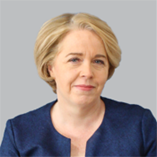Marion Hannon

Ina Sandler
Consultant, Business at OECD
Ina Sandler supports policy activities in the areas of investment, responsible business conduct, anti-bribery and corporate governance as well as Trust in Business. She also contributes to work in the field of economic policy, is actively engaged with Business at OECD’s development activities and supports outreach activities to expand the Business at OECD observer network.
Ina holds a Master’s degree in International Trade, Finance and Development from the Barcelona Graduate School of Economics and a Bachelor’s degree in Economics from the University of Mannheim. She is a German national, fully fluent in English, with good a knowledge of French and basic Italian. She joined Business at OECD in 2019.

Introducing Business at OECD

IAASB Auditor Reporting Project Update, January 2020
The International Auditing and Assurance Standards Board’s (IAASB) Auditor Reporting Implementation Working Group (ARIWG) recently published this Project Update in the form of a Communiqué, which provides an update on the IAASB’s post implementation review (PIR) of the revised auditor reporting standards. This communique also includes other relevant news and information relevant to the IAASB’s PIR.
This Communique does not constitute an authoritative pronouncement of the IAASB, nor does it amend, extend or override the ISAs or other of the IAASB’s International Standards.
IPSASB Completes Guidance on Social Policy Expenditure
The International Public Sector Accounting Standards Board (IPSASB) has issued Collective and Individual Services (Amendments to IPSAS 19), which addresses a wide range of significant government expenditures that directly impact the lives of citizens globally.
Last January, the IPSASB issued IPSAS 42, Social Benefits, providing much-needed guidance on accounting for social benefits expenditure. This new guidance complements IPSAS 42 by providing requirements for accounting for collective services (such as defense at national-levels and street lighting at sub-national levels) and individual services (such as healthcare and education). Collective and Individual Services requires that an expense is recognized at the point of service delivery.
IPSASB Chair, Ian Carruthers, said “I am pleased that, with the publication of Collective and Individual Services (Amendments to IPSAS 19), which complements IPSAS 42, Social Benefits, the IPSASB now has a full set of requirements and guidance on accounting for the most important programs of government.”
About the IPSASB
The International Public Sector Accounting Standards Board (IPSASB) works to strengthen public financial management globally through developing and maintaining accrual-based International Public Sector Accounting Standards® (IPSAS®) and other high-quality financial reporting guidance for use by governments and other public sector entities. It also raises awareness of IPSAS and the benefits of accrual adoption. The Board receives support from the Asian Development Bank, the Chartered Professional Accountants of Canada, the New Zealand External Reporting Board, and the governments of Canada and New Zealand. The structures and processes that support the operations of the IPSASB are facilitated by the International Federation of Accountants (IFAC). For copyright, trademark, and permissions information, please go to permissions or contact permissions@ifac.org.
About the Public Interest Committee
The governance and standard-setting activities of the IPSASB are overseen by the Public Interest Committee (PIC), to ensure that they follow due process and reflect the public interest. The PIC is comprised of individuals with expertise in public sector or financial reporting, and professional engagement in organizations that have an interest in promoting high-quality and internationally comparable financial information.
Issues Collective and Individual Services
IFAC Releases the Second Installment of "Exploring the IESBA Code"
IFAC today released the second installment of its Exploring the IESBA Code educational series: The Conceptual Framework – Step 1, Identifying Threats.
Exploring the IESBA Code is a twelve-month series providing an in-depth look at the International Code of Ethics for Professional Accountants (including International Independence Standards) (the Code). Each installment focuses on a specific aspect of the Code using real-world situations in a manner that is relatable and practical. Readers will gain a better understanding of the thought process behind more complicated areas of the Code through storytelling and expert analysis from professionals involved in developing the standards.
The first installment of the Series looked at the five Fundamental Principles of ethics, which establish the standard of behavior expected of all professional accountants. Compliance with these principles enable accountants to meet their responsibility to act in the public interest. This second installment highlights key aspects of the Code’s Conceptual Framework, which is an approach that all professional accountants are required to apply to comply with the five principles. The installment focuses on identifying threats and will be supplemented by two subsequent installments that will deal with evaluating and addressing threats.
A professional accountant can often come across complex or challenging situations that are not black and white. These challenging situations require ethical considerations, some of which are expressly dealt with in the Code. The unique and informational series was developed by IFAC in collaboration with the International Ethics Standards Board for Accountants (IESBA) to help explain how the Code assists in navigating some of these challenges.
To read and download this and future installments, visit the IFAC website.
The Exploring the IESBA Code was published by IFAC and does not form part of the Code. It is non-authoritative and is not a substitute for reading the Code.
For more information about the Code, please click here.
An Informational Series to Promote the Code of Ethics
IESBA Proposes Guidance to Address the Objectivity of Engagement Quality Reviewers
The International Ethics Standards Board for Accountants (IESBA) today released for public comment the Exposure Draft, Proposed Revision to the Code Addressing the Objectivity of Engagement Quality Reviewers. The proposed limited-scope revision to the International Code of Ethics for Professional Accountants (including International Independence Standards) (the Code) dovetails with the International Auditing and Assurance Standards Board’s (IAASB’s) development of proposed International Standard on Quality Management (ISQM) 2, Engagement Quality Reviews.
The Exposure Draft includes proposed guidance on the application of the conceptual framework in the Code to address the topic of the objectivity of an engagement quality reviewer (EQR), thereby supporting proposed ISQM 2 in addressing the matter of the eligibility of an individual to serve in an EQR role. In particular, the proposed guidance:
- Explains the different types of threat to compliance with the fundamental principle of objectivity that might be created in circumstances where an individual is being considered for appointment as an EQR for a given engagement;
- Sets out factors to consider in evaluating the level of the identified threats; and
- Suggests actions that might be safeguards to address the threats.
The development of the proposal benefited from cooperation with the IAASB within the established coordination framework of the two Boards. The IESBA is proceeding on an accelerated time frame to finalize the proposal in order to align closely with the anticipated finalization of ISQM 2 within 2020.
Comments on the Exposure Draft are requested by March 16, 2020 from all stakeholders.
About the IESBA
The International Ethics Standards Board for Accountants (IESBA) is an independent global standard-setting board. The IESBA serves the public interest by setting ethics standards, including auditor independence requirements, which seek to raise the bar for ethical conduct and practice for all professional accountants through a robust, globally operable International Code of Ethics for Professional Accountants (including International Independence Standards).
The IESBA believes a single set of high-quality ethics standards enhances the quality and consistency of services provided by professional accountants, thus contributing to public trust and confidence in the accountancy profession. The IESBA sets its standards in the public interest with advice from the IESBA Consultative Advisory Group (CAG) and under the oversight of the Public Interest Oversight Board (PIOB).
Proposed Revision to the Code Addressing the Objectivity of Engagement Quality Reviewers
The Exposure Draft includes proposed guidance on the application of the conceptual framework in the Code to address the topic of the objectivity of an engagement quality reviewer (EQR), thereby supporting proposed ISQM 2 in addressing the matter of the eligibility of an individual to serve in an EQR role. In particular, the proposed guidance:
